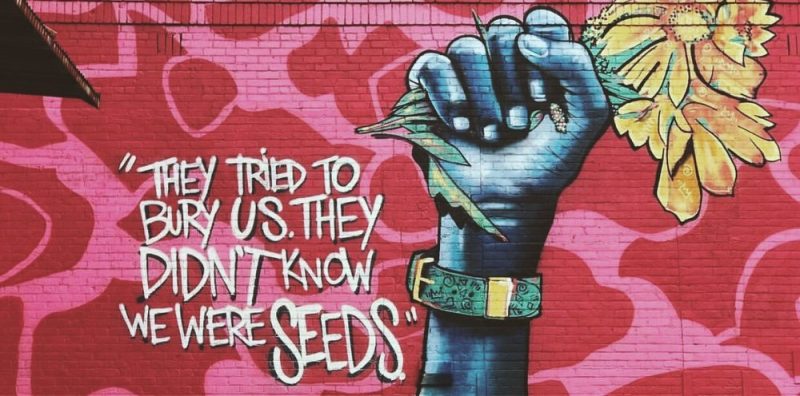I thoroughly enjoyed reading and learning about Testimonios. It called to mind some ideas I have written about in past responses, in particularly, the idea of truth (who/what determines it) and its implications for black women in academia. For me, it seemed that testimonios were the collections of of the first hand experiences of Latina women. We all know that the voice and experiences of women of color have long been ignored. Yet, scholars are using them in their research and using them in a way that directly makes the experiences of women (of color) to be deemed as truth. I have heard of similar forms experience collecting that, akin to testimonios, requires deep reflection (and agency) of the participant and a solidarity and respect from the researcher. In that sense, it reminds me a great deal of participatory action research just taken a step farther to honor the existence of the “subject” and their experiences.
In “Chicana/Latina Testimonios: Mapping the Methodological, Pedagogical, and Political” I got the same decolonial disruption (vibe) that I noticed in Tiffany King’s piece on posthumanism (“Humans Involved: Lurking in the lines of Posthumanist Flight”). Testimonios do indeed disrupt white supremacy (directly) in higher education. Testimonios disrupt because they challenge many things that academia employs to regulate, surveill, and deny women of color. Testimonios questions academia’s use of objectivity and challenges the idea of legitimacy. Take, for example, Papelitos guardados; the authors describe it as something that is both a concrete and abstract concept of expression that is explored through testimonios. The very idea that something can be both concrete and abstract in academic research is almost baffling to me (because I have been brought up in a white supremacist educational system that rejects and negates this form of individual expression). Lindsay Perez Huber mentions something similar in her piece, “Disrupting apartheid of knowledge: testimonio as methodology in Latina/o critical race research in education”. She recounts a time when an academic colleague questioned her methodology and, in particular, the amount of qualitative data (and her testimonio) she used in her study. They want us to not veer from their broken mold so badly!
I also loved her explanation of the apartheid of knowledge. It is obviously a tool of white supremacy. I just like the term apartheid of knowledge, I think it encapsulates the insidious denial of black and indigenous knowledge in academia. Huber says “The apartheid of knowledge that exists in higher education is much deeper than the marginalization of knowledge that falls outside of the mainstream” (Huber 641). It is much deeper than simple marginalization, it involves that tactics I mentioned earlier (regulation, surveillance, etc.) and more. I would even venture to say that it is violent. Huber says that through the documentation and studying of various testimonios, knowledge and theory are created. Testimonios are basically created outside of the academy; there is no universal definition (according to Huber); it employs the tradition of oral history (a concept that usually contested and questioned in higher education); is used to highlight injustice and bias in and out of academia. Lastly, testimonio creates and is the community. From what I have read, the “researcher” (I use that term loosely because it is not the same research-subject relationship) cannot and does not speak for the women involved in the study; they are “co-constructors” of the knowledge. Considering the relationship between the women involved, I know for a fact that space they occupy to create these testimonios is very safe and empowering. It is a very dope response to the apartheid of knowledge. There is truth in us (women of color) and we will continue to mine and cultivate it on our own terms and conditions.
CITATIONS:
Huber, Lindsay Pérez. “Disrupting Apartheid of Knowledge:Testimonioas Methodology in Latina/o Critical Race Research in Education.” International Journal of Qualitative Studies in Education, vol. 22, no. 6, 2009, pp. 639–654., doi:10.1080/09518390903333863.
King, Tiffany Lethabo. “Humans Involved: Lurking in the Lines of Posthumanist Flight.” Critical Ethnic Studies, vol. 3, no. 1, 2017, p. 162., doi:10.5749/jcritethnstud.3.1.0162.


